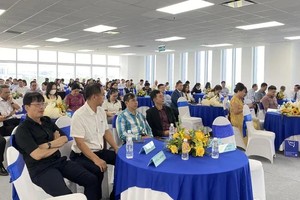The healthy development of Vietnam’s digital asset market will require a coordinated set of measures, including refining the legal framework, strengthening regulatory oversight, enhancing risk management practices, and investing in specialized training for professionals in financial technology and blockchain. Crucially, early steps must be taken to establish a national blockchain platform and launch a Vietnamese cryptocurrency exchange.

Billions of US dollars in the form of cryptocurrency
Cryptocurrency trading emerged in Vietnam years ago, with a significant boost from the decentralized finance (DeFi) surge in 2017, prompting the rise of several trading platforms. By 2021, these platforms saw strong engagement from Vietnamese users, though few disclosed transaction data. Investment organization statistics show Vietnam ranked fourth globally in monthly trading volume on Binance, one of the world’s largest cryptocurrency exchanges.
Specifically, in May 2024 alone, trading volume from Vietnamese investors on Binance surpassed US$20 billion. While cryptocurrency transactions are not restricted by geographic boundaries, users in Vietnam can purchase digital assets locally and withdraw funds to foreign bank accounts via global exchanges such as Binance, OKX, and Bybit.
In May 2025, Vietnam’s cryptocurrency market recorded an estimated trading volume of $60 billion through exchanges. However, cryptocurrencies pose risks including financial insecurity, fraud, and terrorist financing. The FBI’s Internet Crime Complaint Center (IC3) reported 150,000 crypto-related fraud cases in 2024, with losses exceeding $9.3 billion—a 70 percent increase from the previous year. Vietnam ranks among the top six countries for fraudulent transaction volume globally.
To address these risks, many countries have tightened controls on crypto capital flows. Exchanges enforce strict measures, such as advanced KYC verification, proof of funds, and transaction purpose confirmation, adhering to anti-money laundering and counter-terrorism financing laws. For instance, Coinbase mandates detailed declarations for international transfers to comply with U.S. regulations and global FATF standards, while some platforms restrict withdrawals to foreign accounts.
Moving in line with the trend
Vietnam's digital technology legal landscape has changed rapidly, creating favorable conditions for technology businesses and investors. In the first half of June 2025, three important documents were issued consecutively.
The Vietnam Blockchain Association said that rapid establishment of a comprehensive legal framework is a crucial foundation for the robust development of blockchain technology, crypto assets, and related services helping to position Vietnam on the global technology map.
Most recently, on June 14, 2025, the National Assembly officially passed the Law on the Digital Technology Industry, which will take effect on January 1, 2026. This is Vietnam’s first legal document to formally define crypto assets, providing a clear regulatory pathway to foster innovation while enhancing oversight, investor protection, and operational efficiency.
Just days earlier, on June 12, 2025, blockchain was officially designated a Strategic Technology under the Prime Minister's Decision No. 1131/QD-TTg. Strategic technology applications identified in this decision include blockchain network infrastructure, digital assets, cryptocurrencies, and traceability systems.
From a global business perspective, Country Director of Binance Lynn Hoang remarked that there is still a long journey from drafting to the implementation of specific legal documents. A well-designed legal framework could bring Vietnam significant advantages. According to her, without it, the country perhaps misses critical opportunities; so she hoped Vietnam's policies remain in step with global standards—supporting the growth of the industry while ensuring regulatory safety.
Echoing this sentiment, Operations Director of Kyros Ventures and Coin68 Jenny Nguyen noted that after a period of careful study, the Vietnamese Government has committed to establishing clear legal regulations for digital assets, with the involvement of various ministries and agencies. This marks a turning point for Vietnam’s blockchain and digital asset sectors, which are now closer than ever to being formally recognized under the law.
She added that this progress will create a favorable environment for sustainable growth, particularly benefiting domestic blockchain startups and projects that have already made notable strides in diverse areas of the global blockchain ecosystem.
























